Donald Trump Playboy Interview
At age forty-three, Donald Trump’s 'Playboy' interview presaged what would be one of the most important elections since the end of the Cold War.
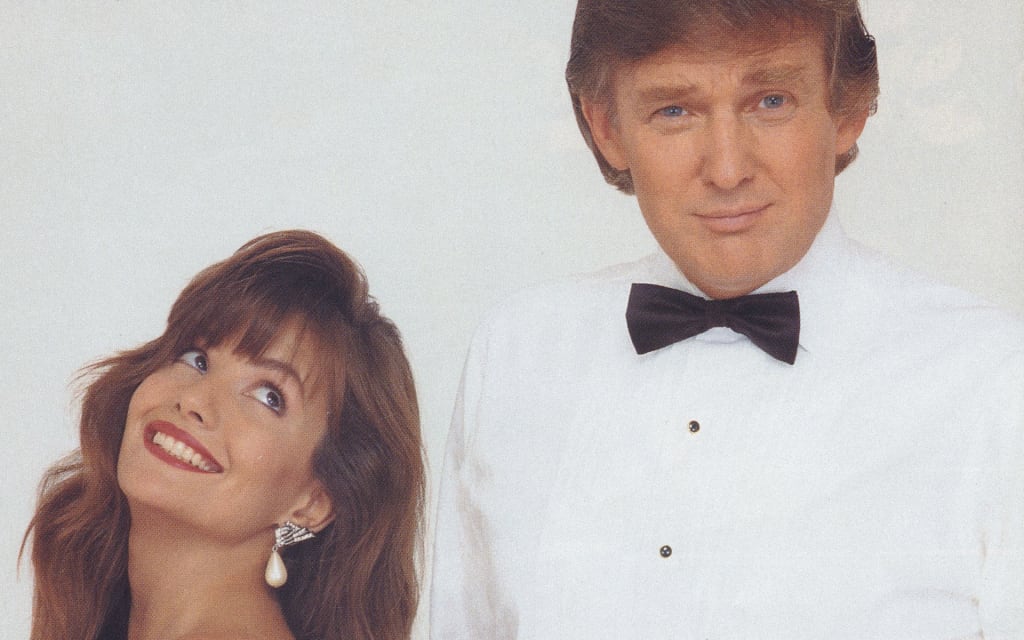
Before the master of hype cemented himself as the master of politics and changed the Republican party forever, he was a lot like every other flamboyant, self-aggrandizing hustler, who happened to be a billionaire. In 2015, he evolved into something that only Mr. Trump himself could have predicted, and he did so. Envisioning himself as president in an iconic Playboy interview in March 1990, while not his priority, was certainly on the table. Ironically enough, he predicted that it would be on the Democratic ticket.
In 1990, Donald Trump sat alone preparing for the below interview with Playboy magazine. There was no team of advisors shaping the future of what they believed would be the next president of the United States of America. He hadn't slept in 48 hours. At 6:00 AM, perched high in the bronze coated jewel of his empire, Trump Tower, he was bent over a mammoth Brazilian-rosewood desk, scrutinizing spreadsheets. No insomnia, no gnawing worries.
Ah, well. To be young, blonde, and a billionaire. It doesn't seem to matter. The most daunting entrepreneur since the Astors, Vanderbilts, and Whitneys, Donald John Trump has made his "art of the deal" work—not just for making money but for crushing adversaries, too. Case in point: Merv Griffin. Ten months after Griffin bought Trump's Resorts International Inc. for $365 million, for which Trump had paid $101 million the year before, Griffin found himself holding a busted balloon. Not only had he inherited the hotel-casino's $925 million debt but he embarrassingly had to report first-half losses of $46.6 million. Talk started of a possible bankruptcy for Merv and a possible lawsuit against Trump. Looking beyond his $1 billion Taj Mahal opening in Atlantic City, Trump has plenty to consider. There are rumors of his building casinos in Nevada and his buying Tiffany's, NBC, the New York Daily News or the Waldorf Hotel ("I've got to have the Waldorf," he coos jokingly into the phone. "I can't sleep without it.")
And the Presidency? No, that takes an election, and it is clear that Trump is not that patient. Too much to do! The billion-dollar baby was born in the exclusive Jamaica Estates in Queens, New York, on June 14, 1946, to a mere millionaire, real estate developer Fred Trump, who had racked up his $20 million fortune building low-to-middle-priced homes and apartments in Brooklyn and Queens. Among the five little Trumps, only Donald seemed to have a passion for mortar and bricks, riding around construction sites with his father—"who ruled all of us with a steel will"—and showing younger brother Robert, now a low-profile V.P. in the Trump organization, who was boss in their 23-room house. At the age of eight, little Donald borrowed Robert's cherished toy blocks, glued them together into one giant skyscraper and never returned them, thereafter exercising his fantasies about changing Manhattan's skyline.
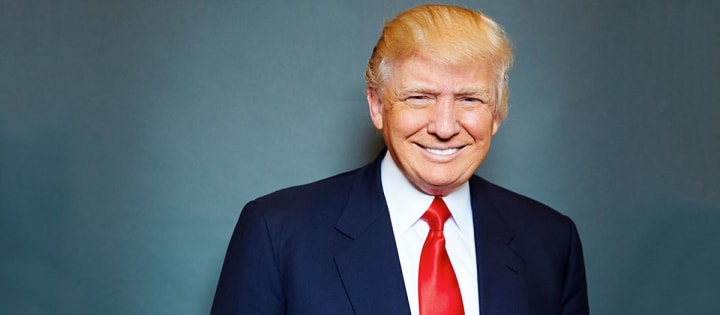
Photo via Jezebel
Playboy: You aren't known for being shy at promotion; Let's start by playing a little game. Trump Tower is ___ ?
Donald Trump: The finest residential building anywhere.
The Taj Mahal in Atlantic City is going to be ___ ?
The most spectacular hotel-casino anywhere in the world.
And the Trump Shuttle will be ___ ?
Easily the number-one service to Washington and Boston.
Your apartment sales are ____?
The best. Trump Tower and Trump Parc have seventy percent of the top sales in New York per square foot.
Why?
Simple: People know they're going into a building where no expense is spared, where the level of materials and finishes will be the best, where the location will be the best. Many European and Japanese investors literally give their subordinates instructions to buy apartments only in Trump buildings. A Japanese investor just paid me $20 million bucks for seven apartments he's turning into one.
OK. But here we are at the start of a new decade. How do you respond when people call you ostentatious, ego-ridden, and a greedy symbol of the 80s?
Rich men are less likely to like me, but the working man likes me because he knows I worked hard and didn't inherit what I've built. Hey, I made it myself; I have a right to do what I want with it.
With so much poverty on the city streets, isn't it embarrassing for you to flaunt your wealth?
There has always been a display of wealth and always will be, until the depression comes, which it always does. And let me tell you, a display is a good thing. It shows people that you can be successful. It can show you a way of life. Dynasty did it on TV. It's very important that people aspire to be successful. The only way you can do it is if you look at somebody who is.
And for you, sitting snugly inside the 118 rooms of your Palm Beach mansion—
People understand that the house in Florida is business. I use it very seldom. I could be happy living in a studio apartment.
Oh, come on.
I mean it; The houses, the planes, and the boat are just investments. I paid $29 million for the Khashoggi yacht; two years later, I'll be selling it for more than $100 million and getting a bigger one.
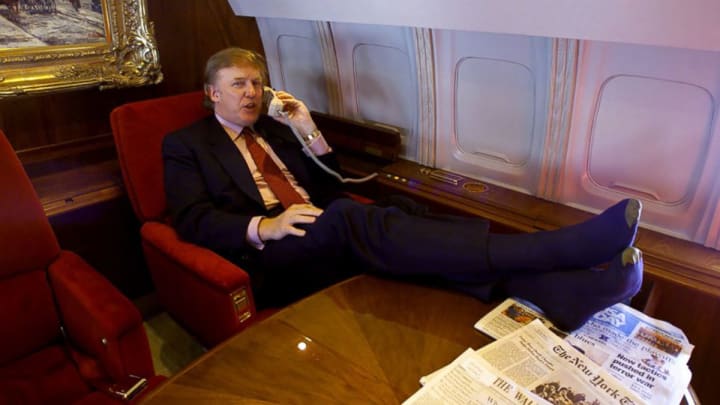
Photo via abc News
Why in the world do you need a bigger yacht?
I don't. But the Khashoggi boat is worth more only if I sell it. This new one will—believe it or not—be even more spectacular and bring tremendous acclaim to Trump properties in Atlantic City.
What is it that attracts you to all this glitz?
I have glitzy casinos because people expect it; I'm not going to build the lobby of the IBM office building in Trump Castle. Glitz works in Atlantic City, and yet The Plaza Hotel has been brought back to its original elegance of 1907. So I don't use glitz in all cases. And in my residential buildings, I sometimes use flash, which is a level below glitz.
Then what does all this—the yacht, the bronze tower, the casinos—really mean to you?
Props for the show.
And what is the show?
The show is "Trump" and it has sold out performances everywhere. I've had fun doing it and will continue to have fun, and I think most people enjoy it.
Do you think the ones who hate it or are jealous?
They could be whatever—but the vast majority dig it.
Calvin Klein, who doesn't have a fraction of your wealth, has often said he feels guilty about his. Do you?
It's not overriding, but I do have it.
You don't sound guilty at all.
I do have a feeling of guilt. I'm living well and like it, I know that many other people don't live particularly well. I do have a social consciousness. I'm setting up a foundation; I give a lot of money away and I think people respect that. The fact that I built this large company by myself, working people respect that; but the people who are at high levels don't like it. They'd like it for themselves.
Do you see yourself as greedy?
I don't think I'm greedy. If I were, I wouldn't give to charities. I run the Wollman Skating Rink in New York City for nothing and I gave away the royalties from my book. I give millions for charity each year. If I were really greedy...
You mean like Leona Helmsley, the convicted hotel queen?
Yes, like Leona Helmsley. She is a vicious, horrible woman who systematically destroyed the Helmsley name. I know Leona better than anybody does but Harry [Helmsley]. If Harry had one fault, it was giving her too much leeway. When I was twenty, Harry was the big guy in town. I once drove my car down the street in Manhattan, saw him at a corner, stopped and introduced myself, and offered him a ride. When I pulled over on the left side of the street, with traffic on the right, he asked me to get out of the car so he could get out on the left side. I thought to myself, this is a highly conservative guy. He never would have evaded taxes on his own. But Leona pushed and pushed him. He needed that money like you need 56 cents in your pockets, I'm telling you. Also, Leona was not a great businesswoman but a very bad one. She sold me the St. Moritz Hotel and a few years later, I made more than $100 million on it. She ran that hotel badly. She set the women's movement back 50 years. She is a living nightmare, and to be married to her must be like living in hell.
On the other hand, your wife, Ivana, is doing a great job running the Plaza, right?
Well, I have told Ivana, “Whatever Leona would do, do the opposite (laughs) Be nice to everybody." And she is nice, anyway.
Was it simple greed with Leona?
Much more than greed. She's out of her mind. Leona Helmsley is a truly evil human being. She treated employees worse than any human being I've ever witnessed and I've dealt with some of the toughest human beings alive.
What do you do to stay in touch with your employees?
I inspect the Trump Tower atrium every morning. Walk into it... it's perfect; Everything shines. I go down and raise hell in a nice way all the time because I want everything to be absolutely immaculate. I’m totally hands-on. I get along great with porters and maids at the Plaza and the Grand Hyatt. I've had bright people ask me why I talk to porters and maids. I can't even believe that question. Those are the people who make it all work... If they like me, they will work harder... and I pay well.
You lost some valued employees in a recent helicopter crash.
Yes. I lost not only brilliant, key players in my company but true friends and I couldn't believe it. At first, I was shocked, called their wives, just kept functioning... My own sense of optimism and life was greatly diminished. I never realized how deaths outside the family could have such a profound effect on me.
What did you think when the shock wore off?
[Pauses] It's a tragic waste. I was also angry in that it was an event that I didn’t want to happen. Here was this press conference, a very mediocre event announcing a minor boxing match. I told these guys that they didn't need to go, but they wanted to be there… They gave their lives for something so unimportant. It’s been a rough time. [Pauses]
What do you think of rich people in general?
Rich people are great survivors and, by nature, they fall into two categories—those who have inherited and those who've made it. Those who have inherited and chosen not to do anything are generally very timid, afraid of losing what they've got, and who can blame them? Others are great risk takers and produce a hell of a lot more or go bust.
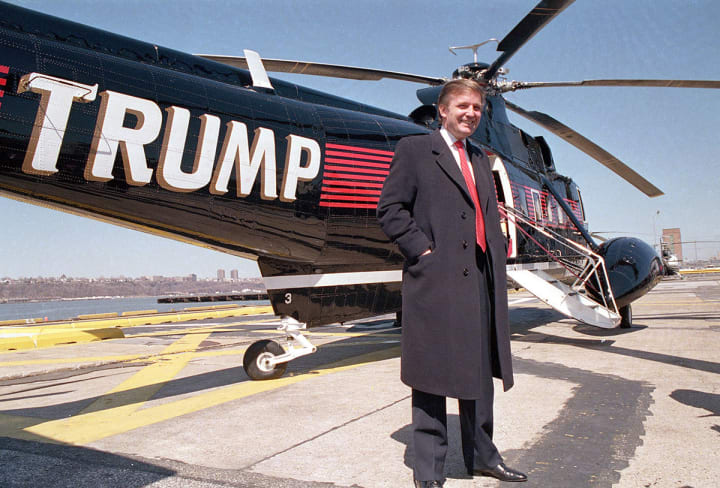
Photo via Gawker
As Merv Griffin did? After buying Resorts International from you, the company may be facing bankruptcy. What happened there?
Merv is a good guy who I have really just gotten to know; we were both judges on the Miss America Pageant after our deal. I don't want to bug him, but prior to buying Resorts, he was telling everybody what a great deal he made and, by inference, what a bad deal Trump made.
But, in fact, you didn't make such a bad deal.
Well, let's just say he didn't out Trump Trump. He has a huge amount of debt. But he is very efficient and has very good PR people. Business Week wrote a story titled "How Donald Taught Merv the Art of the Deal." I was angry. And equally angry when People and Time magazines, with no goddamned research and no knowledge, incompetently reported that Merv had bested Donald. Can you imagine? They didn't do any research. They just listened to PR people. Well, now they know the truth and have asked about following up or correcting stories. I said, "Forget it—it doesn't matter."
What satisfaction, exactly, do you get out of doing a deal?
I love the creative process. I do what I do out of pure enjoyment. Hopefully, nobody does it better. There's a beauty to making a great deal. It's my canvas. And I like painting it. I like the challenge and tell the story of the coal miner's son. The coal miner gets black-lung disease, his son gets it, then his son. If I had been the son of a coal miner, I would have left the damn mines. But most people don't have the imagination—or whatever—to leave their mine. They don’t have "it."
Which is?
"It" is an ability to become an entrepreneur, a great athlete, a great writer. You're either born with it or you're not. Ability can be honed, perfected, or neglected. The day Jack Nicklaus came into this world, he had more innate ability to play golf than anybody else.
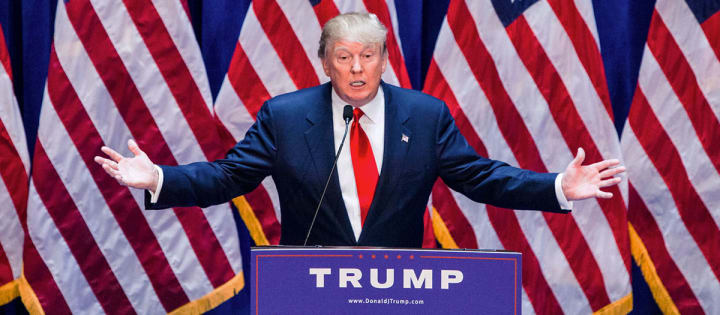
Photo via Astro-tarology
You obviously have a lot of self-confidence. How do you use that in a business deal?
I believe in positive thinking, but I also believe in the power of negative thinking. You should prepare for the worst. If I'm doing a deal, I want to know how bad it's going to be if everything doesn't work rather than how good it's going to be. I have a positive outlook, but I'm unfortunately also quite cynical. So if all the negatives happened, what would my strategy be? Would I want to be in that position? If I don't, I don't do the deal. My attitude is to focus on the down side because the up side will always take care of itself. If a deal is going to be great, it's just a question of how much am I going to make?
How far are you willing to push adversaries?
I will demand anything I can get. When you're doing business, you take people to the brink of breaking them without having them break, to the maximum point their heads can handle—without breaking them. That's the sign of a good businessman: Somebody else would take them 15 steps beyond their breaking point.
What if your pushing results in losing the deal?
Then I pushed him too far. I would have made a mistake. But I don't. I push to the maximum of what he can stand and I get a better deal than he gets.
Another aspect of your deal making is how you handle the media. You managed to suppress an unflattering TV documentary about you funded by your archnemesis, [New York businessman and publisher] Leonard Stern. Do you also claim victory over him?
Total victory, yes. But I don't want to dwell on triumph or defeat.
That may sound magnanimous, but, in fact, you're known to exact revenge on people you think have tried to pull something on you.
I think I'm fair, not tough, in business. But if somebody is trying to do an injustice to me, I fight back harder than anybody I know. When somebody tries to harm you or your family, you have an absolute right to fight back.
Do you hate Stern?
No. Stern is a nonentity to me. He obviously dislikes me enough to spend close to a million dollars trying to make a negative documentary.
You have a lot of enemies in New York City, among them a group that opposes your building a huge Trump City on the Hudson that will include the world's tallest building—on the theory that it will ruin the West Side and cause unbearable congestion. What do you say to them?
Point one: There were more people living on the West Side of New York in the 40s than there are today. Very few people understand that. Point two: Trump City is going to be an architectural masterpiece. Point three: The city desperately needs the taxes, the housing and the shopping that will produce billions of dollars in revenue. Yet that community group [West Pride] fights every job. Those people fighting, I honestly believe that if I proposed an 80 acre park, they would come out and fight me. Selfishly, they like what they have and don't want to give it to anybody else. We need another Rockefeller Center—especially now that Mitsubishi has bought most of the one we had.
Among other things, West Pride claims the largest building in the world would cast a mammoth shadow across the West Side, blocking out light and wrecking the ambience of the neighborhood.
[Angrily] Every building casts a shadow, for God’s sake! I want this job to be dramatic. I strive for that. I don't want it to be contextual, blending into everything else. It shouldn't be like getting a haircut and telling the barber I don't want anyone to know I've gotten one. I am competing here with the state of New Jersey, which is sucking the lifeblood out of New York City. They’re beating us up. Trump City would take the play away from the development of the New Jersey waterfront. There will be nothing in New York to compete with Trump City!
So you're going to build it, come what may?
I'll build it, though it may not be now. I'll wait until things get bad in the city, because every city in every nation has its ups and downs. If I had tried to get the zoning for Trump City in 1975, I would have gotten everything I wanted, because the city was absolutely at a low point. I may now wait for construction to stop, for interest rates to go up—then the city will desperately need Trump City.
You often say that the key to your success is being a good deal maker and a good manager. Why?
I've seen great deal makers go down the tubes because they haven’t known how to manage what they've had. Take [Saudi financier indicted for a felony] Adnan Khashoggi: He was a great deal maker but a bad businessman. Time will tell if Merv is a good manager. He is going to have to be.
When you were growing up in Queens, your father was supposedly a harsh taskmaster. It has been theorized that your father instilled in you a great sense of inadequacy. True?
That's 100 percent wrong. I was always very much accepted by my father. He adored Donald Trump and I've always known that. But I did want to prove to my father and other people that I had the ability to be successful on my own.
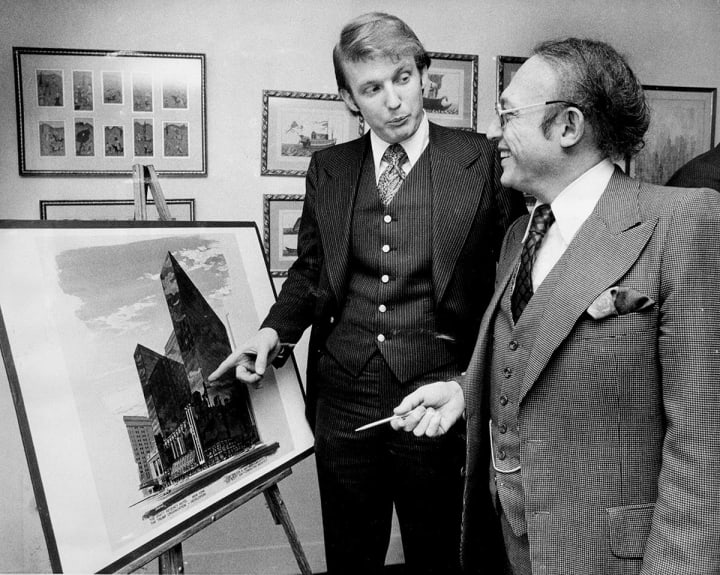
Photo via Vox
You've often said that your father made you work as a teenager and taught you the value of the buck.
My father never made me work. I liked to work during summers. I don't understand these teenagers who sit home watching television all day. Where's their appetite for competition? Working was in my genes.
Still, your father was one tough son of a bitch, wasn't he?
He was a strong, strict father, a no-nonsense kind of guy, but he didn’t hit me. It wasn’t what he'd ever say to us, either. He ruled by demeanor, not the sword. And he never scared or intimidated me.
Your older brother, Fred, who died from heart failure brought on by acute alcoholism, had a more difficult time with him, didn't he?
Take one environment and it will work completely differently on different children. Our family environment, the competitiveness, was a negative for Fred. It wasn't easy for him being cast in a very tough environment, and I think it played havoc on him. I was very close to him and it was very sad when he died... toughest situation I've had ...
What did you learn from his experience?
[Pauses] Nobody has ever asked me that. But his death affected everything that has come after it... I think constantly that I never really gave him thanks for it. He was the first Trump boy out there, and I subconsciously watched his moves.
And the lesson?
I saw people really taking advantage of Fred and the lesson I learned was always to keep up my guard 100 percent, whereas he didn't. He didn't feel that there was really reason for that, which is a fatal mistake in life. People are too trusting. I'm a very untrusting guy. I study people all the time, automatically; It's my way of life, for better or worse.
Why?
I am very skeptical about people; that's self-preservation at work. I believe that, unfortunately, people are out for themselves. At this point, it's to many people’s advantage to like me. Would the phone stop ringing, would these people kissing ass disappear if things were not going well? I enjoy testing friendship... Everything in life to me is a psychological game, a series of challenges you either meet or don't. I am always testing people who work for me.
How?
I will send people around to my buyers to test their honesty by offering them trips and other things. I've been surprised that some people least likely to accept a trip from a contractor did and some of the most likely did not. You can never tell until you test; The human species is interesting in that way. So to me, friendship can be really tested only in bad times. I instinctively mistrust many people. It is not a negative in my life but a positive. Playboy wouldn't be talking to me today if I weren't a cynic. So I learned that from Fred, and I owe him a lot... He could have ultimately been a happy guy, but things just went the unhappy way.
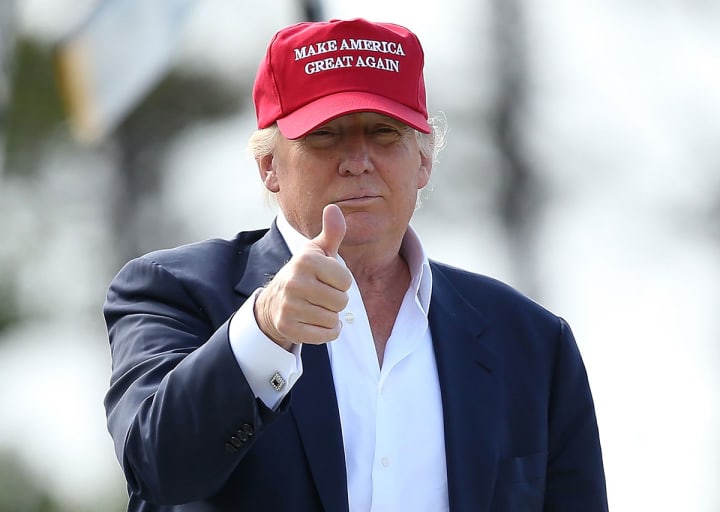
Photo via Vox
How large a role does pure ego play in your deal making and enjoyment of publicity?
Every successful person has a very large ego.
Every successful person? Mother Teresa? Jesus Christ?
Far greater egos than you will ever understand.
And the Pope?
Absolutely. Nothing wrong with ego. People need ego, whole nations need ego. I think our country needs more ego, because it is being ripped off so badly by our so-called allies; i.e., Japan, West Germany, Saudi Arabia, South Korea, etc. They have literally out-egotized this country, because they rule the greatest money machine ever assembled and it's sitting on our backs. Their products are better because they have so much subsidy. We Americans are laughed at around the world for losing $150 billion year after year, for defending wealthy nations for nothing, nations that would be wiped off the face of the earth in about 15 minutes if it weren’t for us. Our "allies" are making billions screwing us.
How do you feel about Japan’s economic pre-eminence?
Japan gets almost 70 percent of its oil from the Persian Gulf, relies on ships led back home by our destroyers, battleships, helicopters, frog men. Then the Japanese sail home, where they give the oil to fuel their factories so that they can knock the hell out of General Motors, Chrysler, and Ford. Their openly screwing us is a disgrace. Why aren't they paying us? The Japanese cajole us, they bow to us, they tell us how great we are and then they pick our pockets. We're losing hundreds of billions of dollars a year while they laugh at our stupidity. The Japanese have their great scientists making cars and VCRs and we have our great scientists making missiles so we can defend Japan. Why aren't we being reimbursed for our costs? The Japanese double-screw the US, a real trick: First they take all our money with their consumer goods, then they put it back in buying all of Manhattan. So either way, we lose.
You're opposed to Japanese buying real estate in the US?
I have great respect for the Japanese people and list many of them as great friends. But, hey, if you want to open up a business in Japan, good luck. It's virtually impossible. But the Japanese can buy our buildings, our Wall Street firms, and there's virtually nothing to stop them. In fact, bidding on a building in New York is an act of futility, because the Japanese will pay more than it's worth just to screw us. They want to own Manhattan. Of course, I shouldn't even be complaining about it, because I'm one of the big beneficiaries of it. If I ever wanted to sell any of my properties, I'd have a field day. But it's an embarrassment! I give great credit to the Japanese and their leaders, because they have made our leaders look totally second rate.
A group of Japanese visitors to New York was recently asked if there were anything in the US they would like to buy. The answer: towels.
That's fair trade: They'll take the towels and we'll buy their cars. It doesn’t sound like a good deal to me. They have totally outsmarted the American politician; They have no respect for us, because they're getting a free ride. Of course, it's not just the Japanese or the Europeans—the Saudis, the Kuwaitis walk all over us.
The Arabs also spend plenty of money in your casinos, don't they?
They lose $1 million, $2 million at the tables and they're so happy because they had such a great weekend. If you lost $1 million, you'd be sick for the rest of your life, maybe. They write me letters telling me what a wonderful time they had.
You have taken out full-page ads in several major newspapers that not only concern US foreign trade but call for the death penalty, too. Why?
Because I hate seeing this country go to hell. We're laughed at by the rest of the world. In order to bring law and order back into our cities, we need the death penalty and authority given back to the police. I got 15 thousand positive letters on the death-penalty ad. I got 10 negative or slightly negative ones.
You believe in an eye for an eye?
When a man or woman cold-bloodedly murders, he or she should pay. It sets an example. Nobody can make the argument that the death penalty isn't a deterrent. Either it will be brought back swiftly or our society will rot away. It is rotting away.
For a man so concerned about our crumbling cities, some would say you've done little for crumbling Atlantic City besides pull $50 million a week out of tourists' pockets.
Elected officials have that responsibility. I would hate to think that people blame me for the problems of the world. Yet people come to me and say, "Why do you allow homelessness in the cities?" as if I control the situation. I am not somebody seeking office.
What about using your influence in Atlantic City to help the disadvantaged?
Everybody has influence, but it is a Governmental problem. I take out those ads to wake up the Government about how Japan and others are ripping our country apart—
Wait. Doesn't it seem that with all your influence in Atlantic City you could do more to combat crime and corruption and put something back into the community?
Well, crime and prostitution go up, and Atlantic City administrations are into very deep trouble with the law, and there are lots of problems there, no question about it. But there is a tremendous amount of money going to housing from the profits of the casinos. As somebody who runs hotels, all I can do, when you get right down to it, is run the best places, bring in as much money as possible, which in turn goes out for taxes. I contribute millions a year to various charities. Finally, by law, I'm not allowed to have Governmental influence; but if they passed legislation that allowed me to get more involved, I'd be very happy to do it. In the meantime, I have the most incredible hotels in the world in Atlantic City. The Taj Mahal will be beyond belief. And if I can awaken the government of Atlantic City, I have performed a great service.
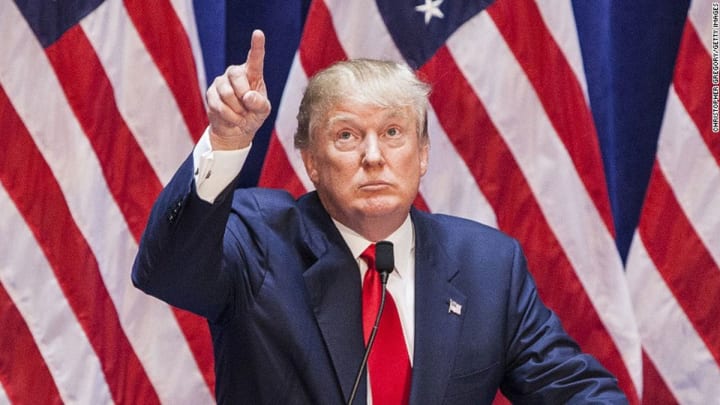
Photo via Right Wing News
We've talked about building low income housing; What have you done about that in other locations?
I did that during the years I worked with my father; I did build both low-income housing and housing for the elderly. And now I'm going to be building more of it. The problem is, that stuff never gets written about.
On the other hand, you were invited to consider building a luxury hotel in Moscow a few years ago. What was your trip to Moscow like?
It was not long after the Korean plane was shot down over Russia. There I am up in my plane when my pilot announces, "We are now fly ing over the Soviet Union," and I'm thinking to myself, What the hell am I doing here? Then I look out the window and see two Russian fighter planes... I later found out, guiding us in. I had insisted on having two Russian colonels flying with me—I felt safer, and my pilot doesn't speak great Russian, which is putting it mildly, and I didn’t want problems in radio communications.
Once you got to Moscow, how did the negotiations go?
I told them, "Guys, you have a basic problem. Far as real estate is concerned, it’s impossible to get title to Russian land, since the government owns it all. What kind of financing are you gonna get on a building where the land is owned by the goddamned motherland?” They said, "No problem, Mr. Trump. We will work out lease arrangements.” I said, "I want ownership, not leases.” They came up with a solution: “Mr. Trump, we form a committee with 10 people, of which seven are Russian and three are your representatives, and all disputes will be resolved in this manner.” I thought to myself, shit, seven to three—are we dealing in the world of the make-believe here or what?
What were your other impressions of the Soviet Union?
I was very unimpressed. Their system is a disaster. What you will see there soon is a revolution; The signs are all there with the demonstrations and picketing. Russia is out of control and the leadership knows it. That's my problem with Gorbachev. Not a firm enough hand.
You mean firm hand as in China?
When the students poured into Tiananmen Square, the Chinese government almost blew it. Then they were vicious, they were horrible, but they put it down with strength. That shows you the power of strength. Our country is right now perceived as weak... as being spit on by the rest of the world—
Why is Gorbachev not firm enough?
I predict he will be overthrown, because he has shown extraordinary weakness. Suddenly, for the first time ever, there are coal-miner strikes and brush fires everywhere—which will all ultimately lead to a violent revolution. Yet Gorbachev is getting credit for being a wonderful leader and we should continue giving him credit, because he's destroying the Soviet Union. But his giving an inch is going to end up costing him and all his friends what they most cherish—their jobs.
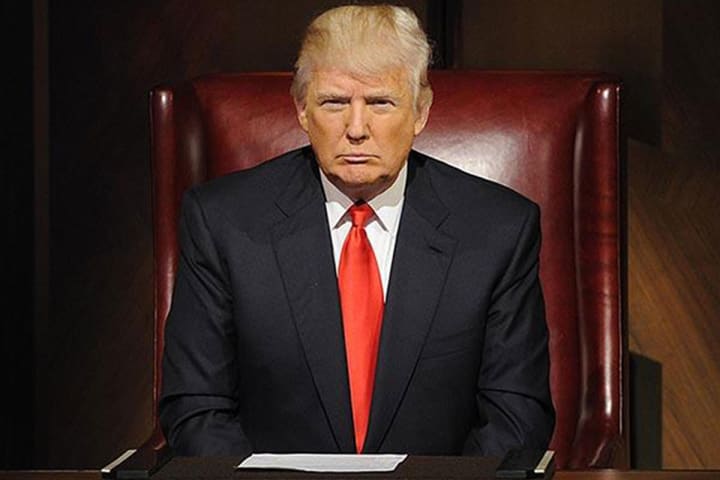
Photo via Telegram
Besides The real-estate deal, you've met with top-level Soviet officials to negotiate potential business deals with them; How did they strike you?
Generally, these guys are much tougher and smarter than our representatives. We have people in this country just as smart, but unfortunately, they're not elected officials. We're still suffering from a loss of respect that goes back to the Carter Administration, when helicopters were crashing into one another in Iran. That was Carter's emblem. There he was, being carried off from a race, needing oxygen. I don't want my President to be carried off a race course. I don't want my President landing on Austrian soil and falling down the stairs of his airplane. Some of our Presidents have been incredible jerk-offs. We need to be tough.
A favorite word of yours, tough. How do you define it?
Tough is being mentally capable of winning battles against an opponent and doing it with a smile. Tough is winning systematically.
Sometimes you sound like a Presidential candidate stirring up the voters.
I don't want the Presidency. I'm going to help a lot of people with my foundation—and for me, the grass isn't always greener.
But if the grass ever did look greener, which political party do you think you'd be more comfortable with?
Well, if I ever ran for office, I'd do better as a Democrat than as a Republican—and that's not because I'd be more liberal, because I'm conservative. But the working guy would elect me. He likes me. When I walk down the street, those cabbies start yelling out their windows.
Another game: What's the first thing President Trump would do upon entering the Oval Office?
Many things. A toughness of attitude would prevail. I'd throw a tax on every Mercedes-Benz rolling into this country and on all Japanese products, and we'd have wonderful allies again.
Would you rescue our remaining hostages in Lebanon?
Number one, in almost all cases, the hostages were told by our Government not to be there. If a man decides to become a professor at Beirut University, when he was told not to be there, and that person is captured—
He deserves it?
You feel very bad for him, but you cannot base foreign policy on his capture. With that being said, when they killed our Colonel Higgins, I would have retaliated militarily immediately. I would have hit something vital to them. And hit it hard. In any other case, I would let the takers of hostages know that they'd have one week to return that hostage. And after that week, all bets would be off. You would not have any more hostages taken, believe me. Weakness always causes problems.
Do you think George Bush is soft?
I like George Bush very much and support him and always will. But I disagree with him when he talks of a kinder, gentler America. I think if this country gets any kinder or gentler, it's literally going to cease to exist. I think if we had people from the business community—the Carl Icahns, the Ross Perots—negotiating some of our foreign policy, we'd have respect around the world.
What would President Trump’s position on crime be?
I see the values of this country in the way crime is tolerated, where people are virtually afraid to say "I want the death penalty." Well, I want it. Where has this country gone when you're not supposed to put in a grave the son of a bitch who robbed, beat, murdered and threw a ninety- ear-old woman off the building? Where has this country gone?
What would be some of President Trump's longer-term views of the future?
I think of the future, but I refuse to paint it. Anything can happen. But I often think of nuclear war.
Nuclear war?
I've always thought about the issue of nuclear war; It's a very important element in my thought process. It's the ultimate, the ultimate catastrophe, the biggest problem this world has, and nobody's focusing on the nuts and bolts of it. It's a little like sickness. People don't believe they’re going to get sick until they do. Nobody wants to talk about it. I believe the greatest of all stupidities is people's believing it will never happen, because everybody knows how destructive it will be, so nobody uses weapons. What bullshit.
Does any of that fuzzy thinking exist around the Trump office?
On a much lower level, I would never hire anybody who thinks that way, because he has absolutely no common sense. He's living in a world of make-believe. It’s like thinking the Titanic can't sink. Too many countries have nuclear weapons; Nobody knows where they're all pointed, what button it takes to launch them. The bomb Harry Truman dropped on Hiroshima was a toy next to today's. We have thousands of weapons pointed at us and nobody even knows if they're going to go in the right direction. They've never really been tested. These jerks in charge don't know how to paint a wall, and we’re relying on them to shoot nuclear missiles to Moscow. What happens if they don't go there? What happens if our computer systems aren't working? Nobody knows if this equipment works, and I've seen numerous reports lately stating that the probability is they don't work. It's a total mess.
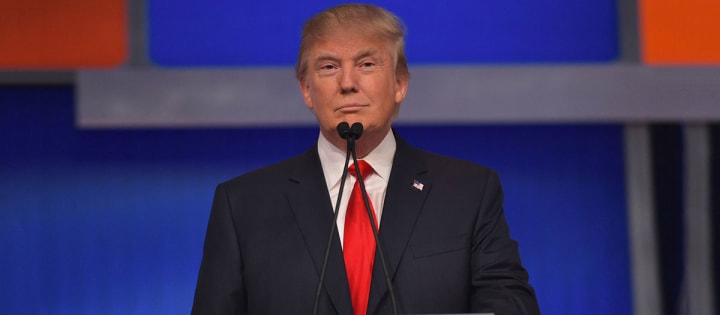
Photo via NBC News
And how would President Trump handle it?
He would believe very strongly in extreme military strength. He wouldn’t trust anyone. He wouldn't trust the Russians; He wouldn't trust our allies; He’d have a huge military arsenal, perfect it, understand it. Part of the problem is that we're defending some of the wealthiest countries in the world for nothing... We're being laughed at around the world, defending Japan—
Wait. If you believe that the public shares these views, and that you could do the job, why not consider running for President?
I'd do the job as well as or better than anyone else. It's my hope that George Bush can do a great job.
You categorically don't want to be President?
I don't want to be President. I’m 100 percent sure. I'd change my mind only if I saw this country continue to go down the tubes.
More locally, one of your least favorite political figures was Mayor Ed Koch of New York. You two had a great time going after each other: He called you "piggy, piggy, piggy" and you called him "a moron." Why do you suppose he lost the election?
He lost his touch for the people. He became arrogant. He not only discarded his friends but was a fool for brutally criticizing them. The corruption was merely a symptom of what had happened to him: He had become extremely nasty, mean spirited, and very vicious, an extremely disloyal human being. When his friends like Bess Myerson and others were in trouble, he seemed to automatically abandon them, almost before finding out what they'd done wrong. He could think only about his own ass—not the city's. That was dumb: The only one who didn't know his administration was crumbling around him was him. Power corrupts.
You probably have more power than Koch did as mayor. And you're getting more of it all the time. How about power's corrupting you?
I think power sometimes corrupts—“sometimes" has to be added.
Also on the local scene, there's a report that you wanted to be an owner of a New York-area baseball team in a proposed new baseball league-despite your bad experience as owner of the New Jersey Generals in the short-lived United States Football League.
That's not true anymore. It's not a passion of mine. The sports business is a lousy business. If a player gets hurt or doesn't perform, he wants to get his money anyway; If he performs better than expected, he wants to renegotiate his contract. I like boxing better.
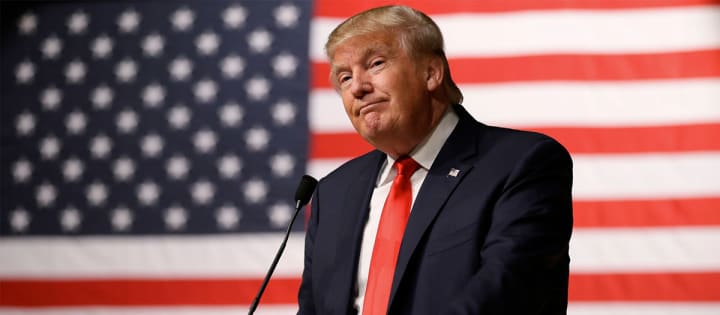
Photo via Business Insider
A clean, forthright sport. As one of Mike Tyson's promoters, what can you tell us about him?
I know Mike better than anybody and have strong opinions, pro and con. But it's too early for me to say. I understand his obsessions, everything. And no, I don't begrudge Don King if he's able to get Mike Tyson to sign a contract to the benefit of Don King.
You got to know him during his marriage to Robin Givens, didn't you?
Yeah; I loved it when Robin said she didn't want any money and then sued him. He won the case against her. She was killed when she started in with the law, when she filed for divorce. Historically, this has been the case with champions. The champ can do no wrong.
How is your marriage?
Just fine. Ivana is a very kind and good woman. I also think she has the instincts and drive of a good manager. She's focused and she's a perfectionist.
And as a wife, not a manager?
I never comment on romance... She's a great mother, a good woman who does a good job.
How did you feel when Jose Torres wrote his book, excerpted in Playboy, about Tyson's sex life—the charges that he beat up women and had wild sexual escapades?
It's unfortunate for one of the great fighters in history to have all this crap hanging over his head. Or for politicians, for that matter. We're living in an age when there are no boundaries left, which is unfortunate for our country. The problem is, we're going to lose good talent because somebody likes looking at pretty women or pretty men. Somebody's sex life may mean absolutely nothing to the job at hand, but when the written word gets out, we lose somebody good and the country goes to hell. I know politicians who love women who don't want to be known for that—because they might lose the gay vote. OK? If this is the kind of extreme we're heading toward, we're really in trouble.
What is marriage to you? Is it monogamous?
I don't have to answer that. I never speak about my wife—which is one of the advantages of not being a politician. My marriage is and should be a personal thing.
But you do enjoy flirtations?
I think any man enjoys flirtations, and if he said he didn't, he'd be lying or he'd be a politician trying to get the extra four votes. I think everybody likes knowing he's well responded to. Especially as you get into certain strata where there is an ego involved and a high level of success, it's important. People really like the idea that other people respond well to them.
You and your wife are often a subject of very biting satire for magazines such as Spy, which calls you a “short fingered vulgarian" and recently published a horrendous close-up photograph of your wife on its cover. How do you feel about that?
Ten years ago, bad publicity was much harder for me to take than it is now. It is almost irrelevant.
That's all you can say about Spy?
It's a piece of garbage.
We assume you take Forbes magazine more seriously; It claims you’re worth $1.5 billion. But you say $3.7 billion. What's the right figure?
I don't say anything. Business Week and Fortune have numbers much higher than Forbes'. I know many people on the Forbes list who shouldn't be there. It's a very inaccurate survey. Malcolm Forbes seems to keep me low. Business Week and Fortune don't have boats and they couldn’t care less.
Speaking of Malcolm Forbes, why didn't you accept his invitation to the Morocco bash?
I wish I could have gone, but I couldn't because of a schedule conflict.
Would you spend $3 million on a party for yourself?
It was a great investment for Malcolm. He got $50 million worth of free publicity. I think he should do it every day of his life. That's like people who can’t understand why I'm building an even more spectacular boat than the Trump Princess. It's going to be world class, beyond belief.
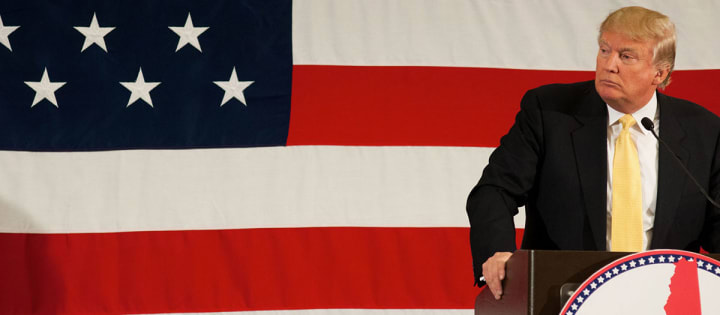
Photo via The American Conservative
Let's talk about your main interest—buildings. Architecture critic Paul Goldberger of The New York Times hasn’t been kind to Trump buildings, panning them as garish and egotistical.
Paul Goldberger has extraordinarily bad taste. He reviews buildings that are failures and loves them. Paul suffers from one malady that I don't believe is curable. As an architecture critic, you can't afford the luxury of having bad taste. The fact that he works for the Times, unfortunately, makes his taste important. And that's why you see some monster buildings going up. If Paul left the Times or the Times left him, you would find that his opinion meant nothing.
But it's not just the architecture critics who criticize you for stamping your name on everything you own. Are you going to continue doing that forever?
No. I own the Grand Hyatt Hotel; I don't call it the Trump Hotel. I own the Plaza Hotel, not the Trump Plaza. But I will say that from a marketing point of view, putting my name on buildings is a plus. I'm now building Trump Palace and if I called it something else, I would get hundreds of dollars less per square foot. On the Trump Shuttle, I've owned it for six months and we are already taking over 50 percent of the market in Washington, Boston, and New York. If I called it anything but the Trump Shuttle, it wouldn't be nearly so successful. The Tour de Trump was actually going to be called the Tour de Jersey. We had 473 reporters at a news conference for a damn bicycle race; How many would have been there for the Tour de Jersey? We would have gotten nowhere.
You're involved in so many activities, deals, promotions—in the deep of the night, after the reporters all leave your conferences, are you ever satisfied with what you've accomplished?
I'm too superstitious to be satisfied. I don't dwell on the past. People who do that go right down the tubes. I'm never self-satisfied. Life is what you do while you're waiting to die. You know, it is all a rather sad situation.
Life? Or death?
Both. We're here and we live our 60, 70, or 80 years and we’re gone. You win, you win, and in the end, it doesn't mean a hell of a lot. But it is something to do—to keep you interested.
Do you agree with the T-shirt that says, WHOEVER HAS THE MOST TOYS WINS?
Depends on your definition of winning. Some of my friends are unbelievably successful and miserable people. I truly believe that someone successful is never really happy, because dissatisfaction is what drives him. I've never met a successful person who wasn't neurotic. It's not a terrible thing... it's controlled neuroses.
What do you mean?
Controlled neuroses means having a tremendous energy level, an abundance of discontent that often isn't visible. It's also not oversleeping. I don't sleep more than four hours a night. I have friends who need 12 hours a night and I tell them they're at a major disadvantage in terms of playing the game.
And when you're up at night, you're totally alone?
Yeah, yeah, because it's a little tough to find anyone up at four in the morning.
You mentioned that you have to be born with "it." Do you suppose your children inherited "it" from you?
Statistically, my children have a very bad shot. Children of successful people are generally very, very troubled, not successful. They don't have the right shtick. You never know until they're tested. But I do well with my children.
Do you think they will have to make it?
I would love them to be in business with me, but 95 percent of those children fail in a sophisticated big business. It takes confidence, intelligence, shtick. If any one of these traits is missing, you're not going to make it.
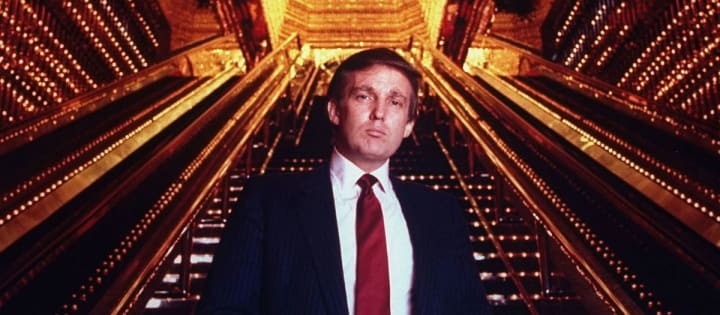
Photo via NBC News
You've always said that you earned, not inherited, your empire, that adversity and uphill struggles made you stronger. What kind of adversity can your children experience?
I'm a strong believer in genes, that my kids can be brought up without adversity and respond well if they have the genes. I have a friend who is extraordinarily smart. But he never became successful, because he couldn't take pressure. He was buying a home and it was literally killing him—a man of forty with an IQ of probably 190. He called me one day for the umpteenth time, worrying about his mortgage and I was sitting in my chair, thinking to myself, Here I am, buying the shuttle, the Plaza Hotel, and I don’t lose an ounce of sleep over any of it. That’s lucky genes.
Even with good genes, how can your kids ever feel they've lived up to what you've accomplished?
I don't know that they'll have to. I would be happier if they were able to preserve rather than build. I'm not looking to have a great deal maker as a son, though I'd certainly like everything to run beautifully when I'm not around. I'd be happier if my son became a great manager rather than a great entrepreneur. My kids are extremely well adjusted. But I wonder what they think when they walk into Mar-a-Lago and see ceilings that rise to heights that nobody's ever seen before. And when my daughter's date picks her up at Trump Tower in a few years and sees the living room, how will he feel when he takes her out and tries to impress her with a studio apartment?
Knowing all this, are you taking any precautions?
It's somewhat late. And I don’t think a paper route would work. But my son works on the boat.
When you think about role models from history, what figures particularly inspired you?
I could say Winston Churchill, but... I've always thought that Louis B. Mayer led the ultimate life, that Flo Ziegfeld led the ultimate life, that men like Darryl Zanuck and Harry Cohn did some creative and beautiful things. The ultimate job for me would have been running MGM in the 30s and 40s—pretelevision. There was incredible glamour and style in those days that's gone now. And that’s when you could control situations. In those days, when your great actor was an alcoholic, and nobody ever found out—that was having tremendous control over things, which would be impossible today.
You talk about glamour and style being gone—but isn't that what you tried to bring back to New York?
Yes, but not in show business, in my business. The Plaza Hotel is far more valuable than any movie I could make. If I put together a string of movies that were all hits, I couldn't have made anywhere near what I made in real estate. I believe I've added show business to the real-estate business, and that's been a positive for my properties and in my life.
So building that second huge yacht isn't an act of gaudy excess but another act in the show?
Well, it draws people. It will be the eighth wonder of the world and will create an aura that seems to work. It will cost me $200 million. But I don’t need it! I could be very happy living in a one-bedroom apartment. I used to live that life. In the early 70s, I lived in a studio apartment overlooking a water tank.
If you were starting over again, in what business would you choose to make your fortune?
Good question... There's something about mother earth that's awfully good, and mother earth is still real estate. With the right financing, you've essentially invested no money. Publishing, movies, broadcasting are tougher, and there aren’t too many Rupert Murdochs, Si Newhouses, Robert Maxwells, and Punch Sulzbergers. I'll stick to real estate.
What about the stock market?
It's a crap shoot. Real estate is something solid. It's brick, mortar.
Do you regret your statements to the press after the October 1987 crash, when you seemed to gloat about getting out in time when others were wiped out?
No. I didn't gloat. Somebody reported that I was out of the market and I confirmed it. I don't know if that's talent or luck or instinct. I then went back into the market after the crash. I think the cash market is the great one right now—cash is king, and that's one of the beauties of the casino business.
You seem very pleasant and charming during interviews, yet you talk constantly about toughness. Do you put on an act for us?
I think everybody has to have some kind of filtering system. I'm very fair and I have had the same people working for me for years. Rarely does anybody leave me. But when somebody tries to sucker-punch me, when they're after my ass, I push back a hell of a lot harder than I was pushed in the first place. If somebody tries to push me around, he's going to pay a price. Those people don't come back for seconds. I don't like being pushed around or taken advantage of. And that's one of the problems with our country today. This country is being pushed around by everyone.
About your own toughness...
Well, as I said, I study people and in every negotiation, I weigh how tough I should appear. I can be a killer and a nice guy. You have to be everything. You have to be strong. You have to be sweet. You have to be ruthless. And I don't think any of it can be learned. Either you have it or you don't. And that is why most kids can get straight As in school but fail in life.
Is there a master plan to your deal making or is it all improvisational?
It's much more improvisational than people might think.
As you continue to make more deals, as you accumulate more and more, there's a central question that arises about Donald Trump: How much is enough?
As long as I enjoy what I'm doing without getting bored or tired... the sky’s the limit.
The sky really was the limit for this middle-aged mogul. But even as a child he believed he was special. Donald Trump as a child? Not so surprising he was much like he is as an adult.
To understand the man, it is best to start at the beginning. A young, impressionable Trump was one of five children. Neither the baby nor the eldest, he did not immediately inherit a title other than “one of the other three middle children.” That is not to say he did not show some interesting prowess at a very young age. Never backing down from a rivalry was a part of his DNA. Unafraid of authority, he never saw teachers as a threat and was not afraid to make his points physically. A closer look at the following childhood attributes of the iconic mogul reveals a great deal about the egomaniacal adult.
Trump's Siblings
Donald Trump was the fourth child among five siblings. But even being one of the younger children of his family couldn’t hold him back as his big personality asserted itself amongst his brothers and sisters. His two sisters and one of his brothers are still alive and one sister is even a United States Federal Judge serving the United States Court of Appeals. One of his brothers, however, has passed aways due to complications with alcoholism.
Trump Steals Blocks from His Brother
In an event that would serve as a microcosm for the man Trump would become, he took away blocks from his younger brother to build his own building as a child. His brother recounted the story that they were both playing with blocks and the young Trump was inspired to create a tall building, a building so tall that he couldn’t make it with just his own blocks. So he took his brother’s blocks to complete his masterpiece. He loved this block building so much he glued it together, putting a permanent end to his brother’s block building. When reflecting back on this incident, Trump claims he didn’t do it to upset his brother, but rather took the chance to make something bigger and better when the opportunity presented itself. A story worthy of The Fountainhead that would make Ayn Rand proud.
Trump Punches a Teacher in the Face
Trump was assertive and forceful from a very early age. Despite not having the ability to use millions of dollars and a huge team of lawyers to bully any opposition that might pop up, young Trump used his fists to assert his authority. Back when he was in second grade he gave his music teacher a black eye because he thought he didn’t know anything about music. Trump sees this as proof of the positive attribute of standing up and making his opinions known through forceful means. The only difference now is instead of using his fists to get his way he uses his brains, wealth, and attorneys.
Watching His Father Crush the Competition
Trump earned his competitive spirit by watching his father in action. He took notice of the fact that every time his father would start a building project, two or three of his competitors would start rival construction projects nearby. But his father always finished his buildings first, and his project would always be better-looking than his competitors, and offer more amenities and more space. He’d rent them out and after his competition went bankrupt he’d acquire their buildings, adding them to his empire. This competitive spirit came to influence Trump’s perception of economic competition and serves as his guiding principles for how he manages businesses to this day.
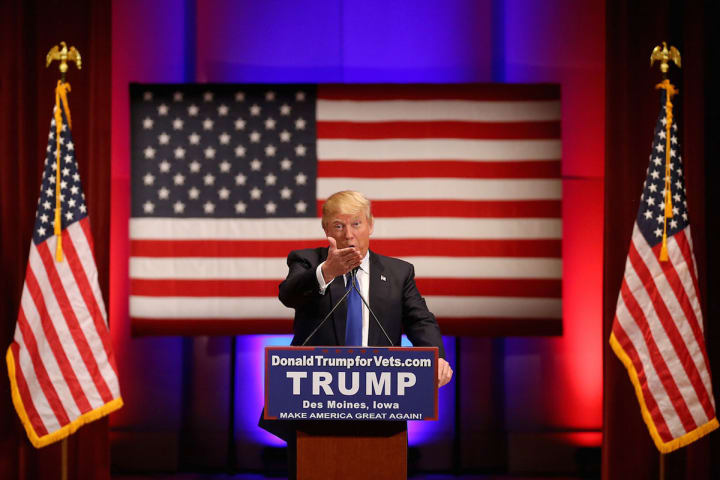
Photo via Upstream Ideas
Trump Learns Humility from the Military
Trump was as difficult as a child as he is as an adult. But his time in the military academy taught him how to channel his boyhood aggression into achievement. The main person responsible for teaching him how to channel and contain his impulses was Theodore Dobias, a baseball coach who had previously served in World War II. Theodore didn’t take any disrespect or sass from his students, even going as far as to smack the ones who gave him any lip or back talk. The ultimate lesson Trump learned that would serve him greatly later in life was how to respect Theodore’s authority, but also show him that he wasn’t intimidated by it.
Trump at Military Academy
Trump had a reputation for being an especially unruly youth. Due to numerous behavioral problems, Trump was kicked out of Kew-Forest school and enrolled in the New York Military Academy by his parents. Trump took well to the military academy, embracing the military style with so much gusto that by the time he reached his senior year he was participating in marching drills, wearing a uniform, and even attained the rank of captain. Today, Trump believes his time here taught him how to focus his natural aggression into great achievement.
Observing Queen Elizabeth II
One of Trump’s most pivotal memories was being 6 years old and being completely enraptured while watching the coronation of Queen Elizabeth II with his mother. His father hated the royal family and dismissed it, but his mother’s gushing admiration for the royal event showed him the importance of showmanship and skewed his personal tastes towards a flair for the dramatic. This preference is something that would come to greatly influence his presence as an entertainer. He cites his mother’s love of the dramatic and grand as a big inspiration of how to conduct himself as the ultimate showman.
Working in the Family Business During College
While still attending college, Trump didn’t hesitate to start working on building his fortune. He began working at his father’s company Elizabeth Trump and Son. Due to these efforts, he was able to turn a 1200 unit apartment in Cincinnati with a 66 percent vacancy rate into one with 100 percent occupancy within two years or taking over the project. Beginning to build this nest egg is what would form his fortune for the rest of his career.
Trump's Bid for Broadway
Thanks to his work at the family business, Donald Trump was worth about $200,000 after graduating from the Wharton School of Business at the University of Pennsylvania. He used his wealth to make a bid on broadway by investing $70,000 to become the co-producer of the 1970 Broadway comedy Paris is Out which become a huge flop and taught him a harsh lesson.
Trump Hides German Ancestry
In both his New York Times biographical profile piece and his 1987 book Art of the Deal, Trump incorrectly asserts that his grandfather is Swedish. He did this because a large percentage of his tenants are Jewish, and he feared potentially scaring them off by revealing his German ancestry given the not too positive perception of Germans by Jews post World War 2.
About the Creator
Filthy Staff
A group of inappropriate, unconventional & disruptive professionals. Some are women, some are men, some are straight, some are gay. All are Filthy.






Comments
There are no comments for this story
Be the first to respond and start the conversation.